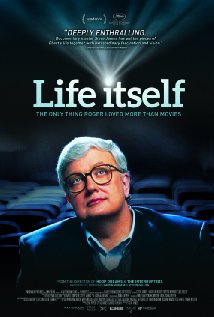
LIFE ITSELF
US, 2014, 120 minutes, Colour.
Roger Ebert, Chaz Ebert, Gene Siskel, Marlene Siskel, Werner Hertzog, Errol Morris, Ramin Bahrani, Gregory Nava, Martin Scorsese.
Directed by Steve James.
Life Itself is an exuberant title for an autobiography. It was the title that celebrated film critic, Roger Ebert, chose for his. And it is the title chosen for this biographical portrait as well as tribute to him.
There is some irony in this because in the years of the making of the film, Roger Ebert was often hospitalised, having a cancer of the jaw which disfigured his face, eventually prevented him from speaking except through a computerised voice. Which must have been great difficulty, despite his evident cheerfulness, because his voice was louder than life. Ebert himself, his wife, Chaz, felt that it was important for audiences for the film to see him as he was, healthy and active in his past life, confined and so disabled in his last years. There are many hospital scenes, no shirking the reality of illness – which does make some of the sequences difficult to watch but makes the audience fully aware of the reality of cancer and its consequences.
Life Itself does show Ebert’s life. He was born in Illinois, affirmed by his parents, wanting to go to Harvard but having to settle for a local university, editing the paper, showing, at 21, a talent for news and social comment, and not only participating in the production of the paper but even delivering it! It was an opening at the Chicago paper in 1967, when the film reviewing column fell vacant, that Roger Ebert took it on, found that he enjoyed it, and continued reviewing for almost 45 years.
When he had the opportunity to appear on television, audiences responded to his reviewing and his style, his wide range of interest, appreciating so many genres and conventions, and eager to communicate his views. For many years was on television with Gene Siskel, younger than Ebert, not agreeing with everything that Ebert said – and there are quite a number of clips of their on-screen reviewing as well as some cutaways to their arguments, sometimes squabbles. Siskel was to die comparatively young – and his wife is one of the talking heads throughout the film, commenting that with the two of them arguing it was really like young kids going at each other.
There is a lot of information, the fact that Ebert wrote the screenplay for the exploitation film, Beyond the Valley of the Dolls in 1969, his visits to the Cannes film Festival, his meeting with a variety of directors as well as of the producers of his program. many of them appearing here as talking heads, or with something interesting to say – including directors Errol Morris, Gregory Nava, Ramin Bahrani, Werner Hertzog and, especially, Martin Scorsese.
Ebert and Siskel connected strongly with the public and, with their characteristic logo “Two Thumbs Up”, they alerted their viewers to many interesting films.
While there still some on-screen reviewers, they are, perhaps, a dying breed – Margaret and David , no surnames needed, have ended 28 year commitment to review on Australian television. Nowadays, it is radio, website or blogging. Which is what Ebert himself did, blogging, until his death in 2013.
A must for anybody interested in popular cinema – and an interesting and warm documentary for many audiences.
1. The reputation of Roger Ebert, the portrait of his life, career, personality? His interest in film, writing, television review, partnership with Gene Siskel, promotion of film and film-makers, his long illness, death?
2. Ebert’s autobiography, Life Itself, an affirmation of life? The variety of chapters and the quotes in the film?
3. The early introduction to his illness and death, making the portrait real, the visuals of his face, the cancer, its effect? His need for a computer to communicate? The computerised voice? His relationship with Chaz, her care for him, the family? The scenes in the hospital, the staff, the treatment, the years, his not wanting to be revived? His comparatively young age?
4. The information about Ebert, the range of photos, especially from his childhood? The narrative, from Illinois, his relationship with his parents, his education, their affirming him, writing, wanting to go to Harvard but going to the local university, writing for the paper, editing it at a young age, his interest in politics and social comment, the assassination of JFK, involved in the paper, even delivering it? His associates? The achievement?
5. The range of talking heads throughout the film, Chaz, producers, film-makers, range of friends, directors like Gregory Nava Ramin Bahrani, Werner Hertzog, Errol Morris, Martin Scorsese, the range of producers?
6. Chaz, mixed racial relationship, the children, seeing her in action?
7. His beginning to write reviews, the opening of the Chicago paper, not having special qualifications, but writing well? 1967? His interest with Russ Meyer, writing Beyond the Valley of the Dolls? The clips? So many people surprised afterwards that he wrote this film?
8. The meeting with Gene Siskel? Siskel’s wife comments throughout the film, the assessment of her husband, of his relationship with Roger Ebert, the competitiveness? Siskel’s personality? Working together, the comment that they were like wto kids? The clips from their programs, the cutting to their discussions, Ebert and his being pedantic? The quality of their reviews, comments, talk? The symbols of the thumbs up?
9. Siskel, his age, illness, keeping it a secret, his death? The blog tribute to Siskel?
10. Ebert in Cannes, the discussions with directors, promotion, Scorsese’s comments?
11. His being reduced blogging, his loving it, the effect?
12. The permeation of the film with his love and knowledge of cinema? Not highbrow, but appreciating the range of film and styles?
13. The director of this documentary, his list of questions, Ebert’s replies? Ebert’s praising the director?
14. An interesting documentary, warm and human as well as informative?